Edited by Andrew Roberts
Trumpington’s history in the second half of the 19th century, including housing development to the north of the village, population growth and the building of the Cambridge-Bedford railway. One of a series of pages with Trumpington’s timeline.
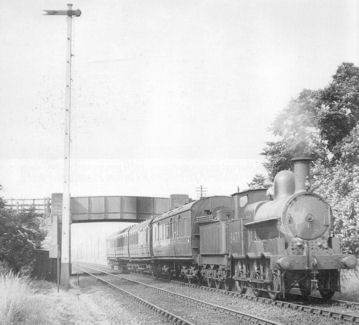
1851
Census carried out on 30 March, population of Trumpington 771 people. A Religious Census was also carried out across the country.
Sources of information: The Victoria History of the Counties of England (1948). The History of the County of Cambridge & the Isle of Ely. Volume II, page 138. The Victoria History of the Counties of England (1982). A History of Cambridgeshire and the Isle of Ely, Volume VIII. Armingford and Thriplow Hundreds. Trumpington, page 249.
Local History Group web page: 1851 Census of Trumpington.
1852
Completion of the Kings Cross to Cambridge railway line, merging with the Liverpool Street to Cambridge line at the ‘Shepreth Branch Junction’ to the south of Trumpington.
Sources of information: Fellows, Reginald B. (1976). London to Cambridge by Train 1845-1938. Cambridge: Oleander Press.
Local History Group web page: Introduction to Railways in Trumpington and The Railways of Trumpington, 1845-2010.
1857
Building of the Schoolmaster’s House, next to the Church School, Church Lane. The house was designed by acclaimed architect William Butterfield and constructed by L. Gray & Son, Cambridge.
Sources of information: Hill, Rosemary (2004). ‘Butterfield, William (1814-1900)’, Oxford Dictionary of National Biography. Oxford University Press. [accessed 3 February 2011] Taylor, David (n.d.). The School House, Trumpington, 1857. William Butterfield: Architect . Unpublished (see Web page below). The Victoria History of the Counties of England (1982). A History of Cambridgeshire and the Isle of Ely, Volume VIII. Armingford and Thriplow Hundreds. Trumpington, page 266.
Local History Group web pages: The School House, Trumpington, and William Butterfield. Education and schools in Trumpington.
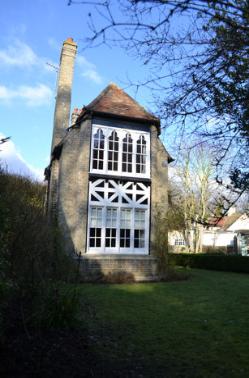
1858
The Unicorn public house recorded as a brewhouse, to the north of the school and headmaster’s house on Church Lane.
Sources of information: The Victoria History of the Counties of England (1982). A History of Cambridgeshire and the Isle of Ely, Volume VIII. Armingford and Thriplow Hundreds. Trumpington, page 251.
Local History Group web page: The Unicorn public house.
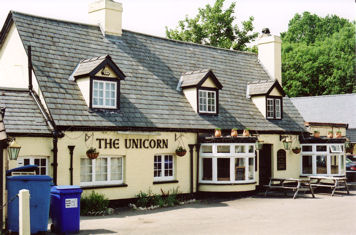
1860s
A boom in the extraction of coprolites across the parish.
Sources of information: Grove, Richard (1976). The Cambridgeshire Coprolite Mining Rush . O’Connor, Bernard (1998). The Dinosaurs on Coldham’s Common: the Story of Cambridge’s Coprolite Industry. O’Connor, Bernard (1999). The Trumpington Fossil Diggings: An Account of the 19th Century Coprolite Diggings.
Local History Group web page: Farming in Trumpington: Evidence from Censuses.
1861
Census carried out on 7 April, population of Trumpington fallen to 716.
Sources of information: The Victoria History of the Counties of England (1948). The History of the County of Cambridge & the Isle of Ely. Volume II, page 138. The Victoria History of the Counties of England (1982). A History of Cambridgeshire and the Isle of Ely, Volume VIII. Armingford and Thriplow Hundreds. Trumpington, page 249.
Local History Group web page: 1861 Census of Trumpington.
1861
Monument (obelisk) erected at Nine Wells to commemorate the benefactors involved in the building of Hobson’s Brook and Hobson’s Conduit.
Sources of information: Bushell, W.D. (1938). Hobson’s Conduit. The New River at Cambridge Commonly Called Hobson’s River. Gray, E.A. (1977). Hobson’s Conduit, the Story of a Cambridgeshire Chalk Stream. Local History Group web page: Hobson’s Brook and Hobson’s Conduit.
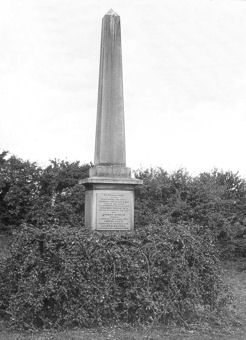
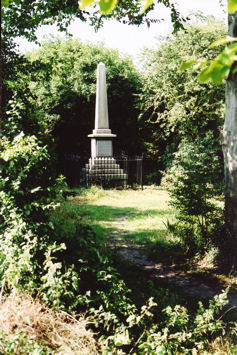
1862
Construction of the Bedford-Cambridge railway line, LNWR, through the parish, from the south west across the River Cam, to the south east of the village and a junction near Long Road with the London-Cambridge line. Opened 1 August 1662.
Sources of information: The Victoria History of the Counties of England (1948). The History of the County of Cambridge & the Isle of Ely. Volume II , page 133. The Victoria History of the Counties of England (1982). A History of Cambridgeshire and the Isle of Ely, Volume VIII. Armingford and Thriplow Hundreds. Trumpington, page 250.
Local History Group web page: Introduction to Railways in Trumpington and The Railways of Trumpington, 1845-2010.
1864
Foundation of the Trumpington Amateur Brass Band by Mr T.R. Higham, Schoolmaster, which thrived for at least 50 years.
Sources of information: Percy Robinson notes held by Local History Group (1910). The Victoria History of the Counties of England (1982). A History of Cambridgeshire and the Isle of Ely, Volume VIII. Armingford and Thriplow Hundreds. Trumpington, page 251.
Local History Group web page: Trumpington Amateur Brass Band.
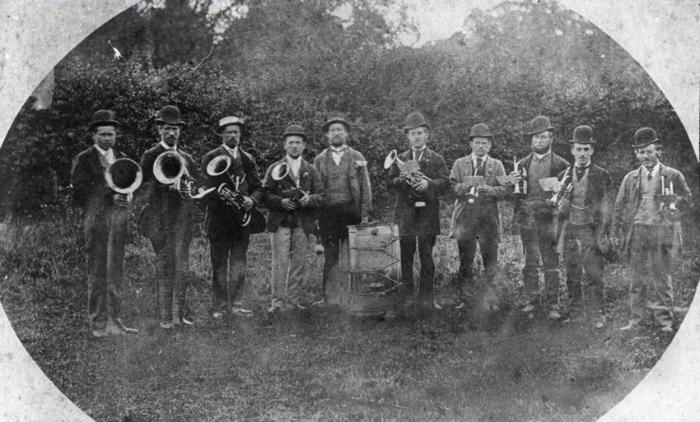
1865
Building of Anstey Hall cottage, Maris Lane, with “ornate Ruskinian Gothic details”, including a design with the date and the initials CFF. This refers to Charles Finch Foster (born c. 1841, died 1920), whose grandfather, Ebenezer Foster, had bought Anstey Hall from the Anstey estate in 1838. Charles Finch Foster also built Pinehurst in Grange Road, Cambridge.
Sources of information: The Victoria History of the Counties of England (1982). A History of Cambridgeshire and the Isle of Ely, Volume VIII. Armingford and Thriplow Hundreds. Trumpington, page 255-56. Entry in the Victorian Web.
Local History Group web page: Evolution of Trumpington village.
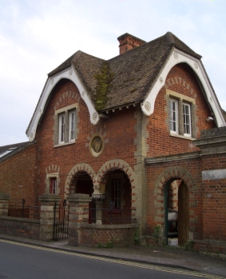
1865-66
Construction of new building for the original Addenbrooke’s Hospital, Trumpington Street, Cambridge.
Sources of information: Rook, Arthur, Carlton, Margaret and Cannon, W. Graham (1991). The History of Addenbrooke’s Hospital Cambridge. Cambridge: CUP. Page 149.
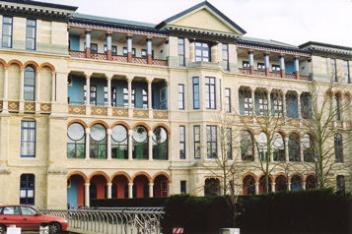
1860s-
The majority of the Trinity College land along the east side of Trumpington Road to the north of Long Road was used to form large estates, such as Leighton House, and St Faith’s School.
Sources of information: The Victoria History of the Counties of England (1982). A History of Cambridgeshire and the Isle of Ely, Volume VIII. Armingford and Thriplow Hundreds. Trumpington, page 250.
Local History Group web page:
1866-69
Construction of Leighton House on the east side of Trumpington Road, for Robert Sayle (now the Perse Preparatory School). Robert Sayle (1816-83) was a retailer and philanthropist.
Sources of information: Sieveking, L.M., Gooch, Jenifer and Daly, Olivia (2008). A History of Robert Sayle, 1840-2007.
Local History Group web page: Reminscences of the Perse Prep School.
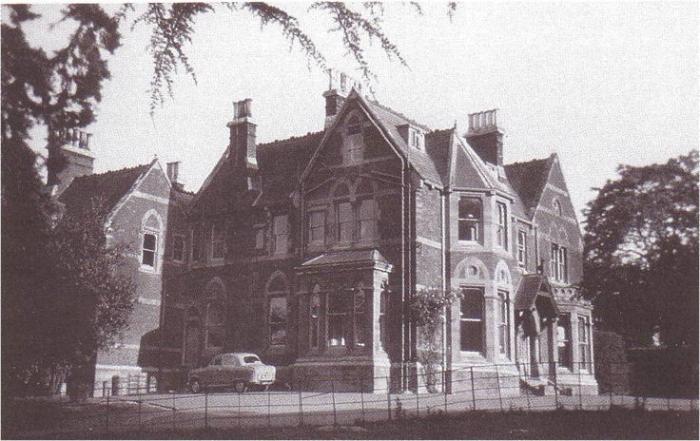
1868
Extension of the Church School by the addition of an infants’ schoolroom.
Sources of information: The Victoria History of the Counties of England (1982). A History of Cambridgeshire and the Isle of Ely, Volume VIII. Armingford and Thriplow Hundreds. Trumpington, page 266.
Local History Group web page: Education and schools in Trumpington.
1870
Elementary Education Act: Board Schools provided an education for the 5-10 age group, but it was not yet compulsory.
Local History Group web page: The Education system in England.
1871
Census carried out on 2 April, population of Trumpington 841 people.
Sources of information: The Victoria History of the Counties of England (1948). The History of the County of Cambridge & the Isle of Ely. Volume II , page 138. The Victoria History of the Counties of England (1982). A History of Cambridgeshire and the Isle of Ely, Volume VIII. Armingford and Thriplow Hundreds. Trumpington, page 249.
Local History Group web page: 1871 Census of Trumpington.
1875
Publication of the first Parish Magazine.
Sources of information: Church archive.
1876
Construction of Cavendish College, Hills Road (then in Trumpington Parish, buildings taken over by Homerton College in 1892-94).
Sources of information: Sieveking, L.M., Gooch, Jenifer and Daly, Olivia (2008), A History of Robert Sayle, 1840-2007. The Victoria History of the Counties of England (1982). A History of Cambridgeshire and the Isle of Ely, Volume VIII. Armingford and Thriplow Hundreds. Trumpington, page 267.
1877
The Parish Church re-opened in June 1877 after complete exterior restoration. The outer walls, tower and windows were renewed in Bath stone and the roof was raised to the original pitch and covered with lead.
Sources of information: Cambridgeshire Chronicle, 9 June 1877.
Local History Group web page: The History of Trumpington Parish Church.
1878-
Housing developments along Chaucer Road, Newton Road, etc., on land owned by the Pemberton estate.
Sources of information: Renfrew, Jane M., Renfrew, Magnus A. and Rose, John K. (1996). Rus In Urbe . Chaucer Road and Latham Road: the History of Two Rural Roads in Cambridge . The Victoria History of the Counties of England (1982). A History of Cambridgeshire and the Isle of Ely, Volume VIII. Armingford and Thriplow Hundreds. Trumpington, page 250.
Local History Group web page: Developing Chaucer Road and Latham Road.
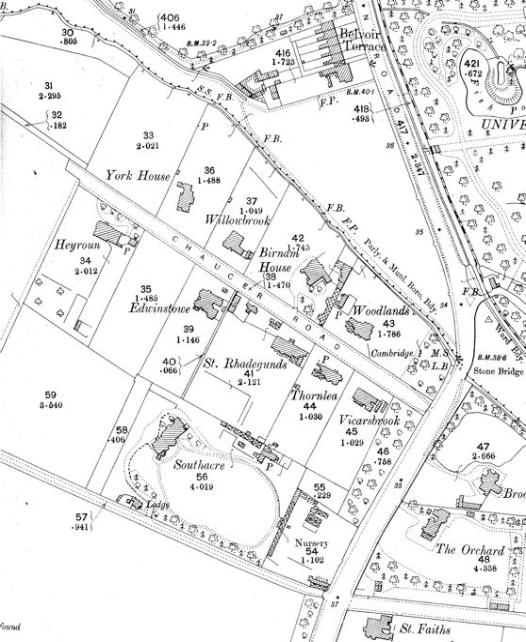
1880
Southacre, Latham Road, built for Reverend Henry Latham of Trinity Hall, in the grounds of a former nursery
Sources of information: Renfrew, Jane M., Renfrew, Magnus A. and Rose, John K. (1996). Rus In Urbe . Chaucer Road and Latham Road: the History of Two Rural Roads in Cambridge.
Local History Group web page: Developing Chaucer Road and Latham Road.
1880
Elementary Education Act requiring compulsory attendance at school from 5-10 years of age.
Local History Group web page: The Education system in England.
1881
Census carried out on 3 April, population of Trumpington 940.
Sources of information: The Victoria History of the Counties of England (1948). The History of the County of Cambridge & the Isle of Ely. Volume II , page 138. The Victoria History of the Counties of England (1982). A History of Cambridgeshire and the Isle of Ely, Volume VIII. Armingford and Thriplow Hundreds. Trumpington, page 249.
Local History Group web page: 1881 Census of Trumpington.
1882 or 1887
The windmill on Long Road stopped working: the Victoria County History says this was after a boiler blew up in 1882, other sources say in 1887. The mill was demolished at some point, the Victoria County History says that only the stump was left by 1930, other sources say c. 1889. By the 1960s, the site had been taken over by the telephone exchange.
Sources of information: The Victoria History of the Counties of England (1982). A History of Cambridgeshire and the Isle of Ely, Volume VIII. Armingford and Thriplow Hundreds. Trumpington, page 261.
1883
Trumpington and Grantchester Horticultural Show.
Sources of information: Cambridge Chronicle, 1883. Trumpington Gardening Society history.
1883
The retailer and philanthropist Robert Sayle died at his home, Leighton House, Trumpington Road, on 5 October 1883. He was buried at Mill Road Cemetery on 10 October, with the inscription “In affectionate remembrance of Robert Sayle JP of Cambridge and China. Born at Southery, Norfolk February 22nd 1816 died at Trumpington, Cambridge October 5th 1883” on his monument.
Sources of information: Mill Road Cemetery Web site [accessed 4 February 2011]. Sieveking, L.M., Gooch, Jenifer and Daly, Olivia (2008). A History of Robert Sayle, 1840-2007. Page 34.
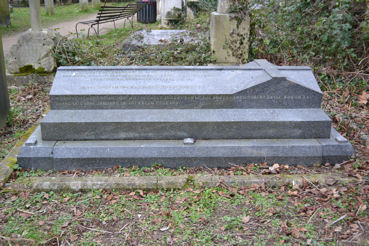
1884
Death of Henry Fawcett on 6 November 1884, buried at the Parish Church on 10 November 1884. Henry Fawcett (1833-84) was an economist and politician, married to Millicent Garrett, who lived at 18 Brookside, Cambridge. His grave is on the south side of the church. It was renovated and rededicated in 2009 and renovated again in 2018.
Sources of information: Goldman, Lawrence (2006). ‘Fawcett, Henry (1833-1884)’, Oxford Dictionary of National Biography.
Local History Group web pages: Henry Fawcett , Man of Vision; Notes about Henry Fawcett; Funeral of Henry Fawcett; Rededication of grave, 1 April 2009.
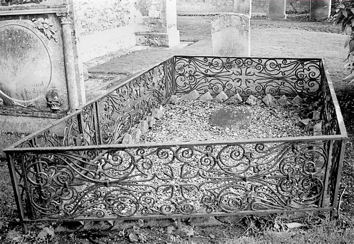
1884
James Payn (1830-98), publishes The Canon’s Ward, with the line “Beside the pleasant mill at Trumpington”.
Sources of information: Text of The Canon’s Ward.
1887
Trumpington celebrated the Golden Jubilee of Queen Victoria, on the fiftieth anniversary of her accession to the throne (21 June 1887) . There was a report in the Cambridge Chronicle on 24 June 1887.
Sources of information: Cambridge Chronicle, 24 June 1887 and dinner invitation.
Local History Group web page: Celebrating Queen Victoria’s Golden Jubilee, June 1887.
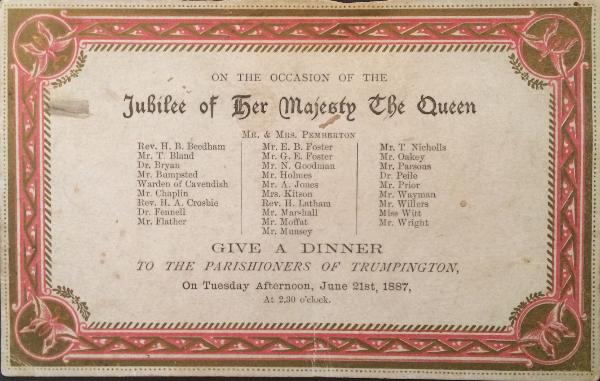
1888
The Indian Prince Ranji (Ranjitsinhji Vibhaji, maharaja jam sahib of Navanagar), a renowned batsman who later played for England, lived at 1 Chaucer Road.
Sources of information: Renfrew, Jane M., Renfrew, Magnus A. and Rose, John K. (1996). Rus In Urbe. Chaucer Road and Latham Road: the History of Two Rural Roads in Cambridge. Wilde, Simon (2004). ‘Ranjitsinhji Vibhaji, maharaja jam sahib of Navanagar [Ranjitsinhji or Ranji] (1872-1933)’, Oxford Dictionary of National Biography.
Local History Group web page: Developing Chaucer Road and Latham Road.
1889
Publication of Widnall’s Reminiscences of Trumpington Fifty Years Ago.
Sources of information: Widnall, S.P. [Samuel Page] (1889). Reminiscences of Trumpington Fifty Years Ago. Jennings, Christine (2003). Widnall. A Capital Contriver. the Story of a Victorian Household in the Village of Grantchester.
Local History Group web page: Widnall’s Reminiscences of 1830s Trumpington.
1891
Census carried out on 5 April, population of Trumpington 975 people.
Sources of information: The Victoria History of the Counties of England (1948). The History of the County of Cambridge & the Isle of Ely. Volume II , page 138. The Victoria History of the Counties of England (1982). A History of Cambridgeshire and the Isle of Ely, Volume VIII. Armingford and Thriplow Hundreds. Trumpington, page 249.
Local History Group web page: 1891 Census of Trumpington.
1892-94
Opening of Homerton College in buildings previously occupied by Cavendish College, Hills Road (then in Trumpington Parish).
Sources of information: Sieveking, L.M., Gooch, Jenifer and Daly, Olivia (2008), A History of Robert Sayle, 1840-2007. The Victoria History of the Counties of England (1982). A History of Cambridgeshire and the Isle of Ely, Volume VIII. Armingford and Thriplow Hundreds. Trumpington, page 267.
1892-96
House construction started along Newton Road.
Sources of information: The Victoria History of the Counties of England (1982). A History of Cambridgeshire and the Isle of Ely, Volume VIII. Armingford and Thriplow Hundreds. Trumpington, page 250.
Local History Group web page:
1893
School leaving age raised to 11.
Local History Group web page: The Education system in England.
1893
First Working Men’s Chrysanthemum Show.
Sources of information: Cambridge Chronicle , 7 April 1893, p.4. Trumpington Gardening Society history.
1893
Opening of Trumpington Churchyard Extension (cemetery) at the corner of Shelford Road and Hauxton Road.
Sources of information: The Victoria History of the Counties of England (1982). A History of Cambridgeshire and the Isle of Ely, Volume VIII. Armingford and Thriplow Hundreds. Trumpington, page 265.
Local History Group web page: Trumpington Churchyard Extension: Monument Finding List; Trumpington Churchyard Extension: Highlights.
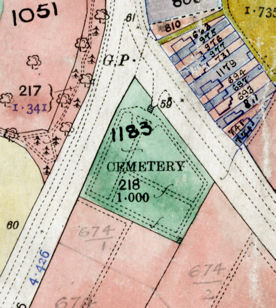
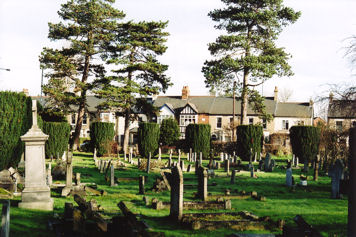
1894
St Faiths School moved from Belvoir Terrace, Cambridge, to Trumpington Road.
Sources of information: The Victoria History of the Counties of England (1982). A History of Cambridgeshire and the Isle of Ely, Volume VIII. Armingford and Thriplow Hundreds. Trumpington, page 267.
Local History Group web page: History of St Faith’s School.
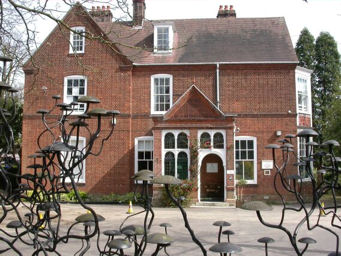
1894
The Oddfellows Sidney Campion Lodge (Friendly Society) was founded in 1894 and based at the Tally Ho Public House in the High Street (then known as London Road). The original Lodge Secretary was David Howard, a Trumpington man who worked as a Domestic Gardener and was secretary of the Brass Band until 1892. Sidney Campion was a Cambridge Justice of Peace and held the post of Mayor of Cambridge on two occasions. By the 1950s the Lodge had moved to the Free Church School, when it was run by the Haslop family.
Sources of information: Stephen Harper-Scott [January 2011].
Late 1890s
Construction of Alpha Terrace to the north of the old village and east of the High Street, mainly built from 1897 to 1910.
Sources of information: The Victoria History of the Counties of England (1982). A History of Cambridgeshire and the Isle of Ely, Volume VIII. Armingford and Thriplow Hundreds. Trumpington, page 250.
Local History Group web pages: Evolution of Trumpington village; Building Alpha Terrace.
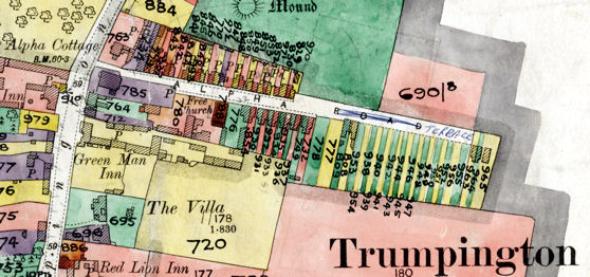
1899
Opening of the Free Church, Alpha Terrace.
Sources of information:
1899
School leaving age raised to 12.
Local History Group web page: The Education system in England.